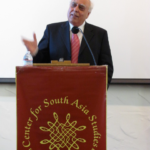 Defending the official policies (or the lack of it) while interacting with an audience in the U.S. can be challenging for a Minister of the Indian Government. Kapil Sibal, India’s Minister of Human Resource Development and Education, needs to be given credit for putting up a great show as a representative of the Government of India. I had the opportunity to attend his talk on September organised by the Center for South Asia Studies (CSAS) at UC Berkeley campus. He did a great job in defending (rather than enunciating) the government’s education policy. However, it seemed that Mr. Sibal was still disturbed by critical comments made during the panel discussion hosted a day prior to his UC Berkeley interaction by Yale University, the U.S. India Business Council and the American India Foundation. At the panel discussion in New York, Pepsi CEO Indra Nooyi challenged Mr. Sibal on what “action” his government was taking and Fareed Zakaria questioned him on how to benchmark India’s progress with that of China. The mood at Berkeley during the initial interactions was somewhat sober. Graduate students of Indian origin were keen to know about possibilities and opportunities available in India.
Defending the official policies (or the lack of it) while interacting with an audience in the U.S. can be challenging for a Minister of the Indian Government. Kapil Sibal, India’s Minister of Human Resource Development and Education, needs to be given credit for putting up a great show as a representative of the Government of India. I had the opportunity to attend his talk on September organised by the Center for South Asia Studies (CSAS) at UC Berkeley campus. He did a great job in defending (rather than enunciating) the government’s education policy. However, it seemed that Mr. Sibal was still disturbed by critical comments made during the panel discussion hosted a day prior to his UC Berkeley interaction by Yale University, the U.S. India Business Council and the American India Foundation. At the panel discussion in New York, Pepsi CEO Indra Nooyi challenged Mr. Sibal on what “action” his government was taking and Fareed Zakaria questioned him on how to benchmark India’s progress with that of China. The mood at Berkeley during the initial interactions was somewhat sober. Graduate students of Indian origin were keen to know about possibilities and opportunities available in India.
Apart from vague reassurances and claims based on recent legislations, Mr. Sibal’s failed to generate a feeling of confidence among the audience. Detailing legislations like Right to Education and plans to spend $60 billion to improve elementary education did not impress the audience most of whom were aware that most government policies fizzle out at the implementation stage in India.
Mr. Sibal’s comments on enhancing mutually beneficial collaboration among universities across the globe and the need for U.S. universities to open campuses in India were appreciated. However, the overall tone of the exchanges sounded strained. Mr. Sibal brushed aside constructive criticism as failure to comprehend challenges confronting India. Even though the audience was predominantly of Indian origin, Mr. Sibal continuously referred to “you” and “us” in a sense that he was speaking to Americans who only knew India through books and movies. It seemed that relocating to the U.S. had denied people of the Indian origin the right and the ability to criticize Indian Government’s policies. The sense that I gathered from Mr. Sibal’s communication was: since “you” avail the best research facilities built over centuries at UC Berkeley “you” can’t pass a judgement on India which is struggling for six decades to address multiple social challenges.
Mr. Sibal may have technically won all arguments during the interaction (after all he is a lawyer by profession) but he seemed to have confounded his audience. I am wondering if he was able to provide any direction to the graduate students in the room who were contemplating moving to India?